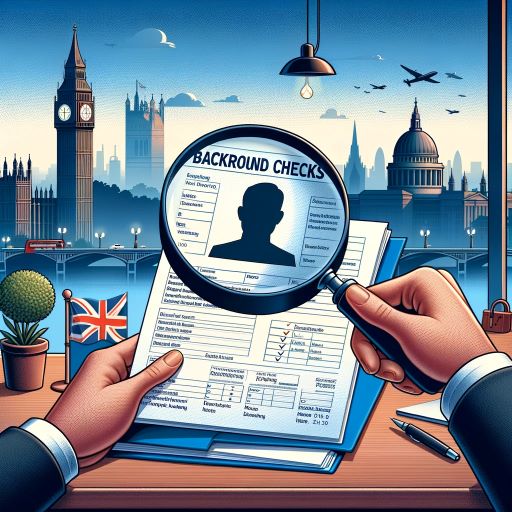

2. Identity Checks: Confirming the candidate's identity through documents like passports or driver's licenses to prevent identity fraud and make sure the person being hired is who they claim to be.
2. Impact on Hiring Decisions: A candidate's social media presence can influence hiring choices, particularly for clientfacing roles.
Preventing unauthorized disclosure Reduces risk of espionage/sabotage
Basic checks like identity verification are swift, but extensive ones like criminal record checks may prolong the process. To manage expectations, employers should communicate the expected timeline to candidates.Prompt responses and organized documentation from candidates can speed up the screening process.
What Is the Name of the Background Check in the Uk?, The name of the background check in the UK is commonly referred to as a Criminal Record Check. It's an essential step in screening programs, especially for roles involving vulnerable populations or positions of trust.
• The process aims to balance efficiency and thoroughness in screening potential employees.
The Baseline Personnel Security Standard (BPSS) and the Disclosure and Barring Service (DBS) check are both used in the United Kingdom for background checks, but they serve different purposes and involve different levels of scrutiny.
While both are forms of background checks, their specific purposes, scope, and usage differ significantly, tailored to meet various security and safety requirements in employment and roles of trust
The BS7858 check refers to the British Standard (BS) 7858, which provides a code of practice for the security screening of individuals employed in a security environment. This type of vetting process is specifically designed for positions where the integrity and reliability of personnel are of paramount importance due to their access to secure areas, sensitive information, or involvement in the security sector. The BS7858 screening is often required for:
Security Personnel: This includes individuals working as security guards, CCTV operators, bodyguards, and any other roles directly related to physical security services.
Alarm, Lock, and Safe Engineers: Professionals involved in the installation, maintenance, or repair of security systems, locks, and safes, where they have unsupervised access to secure or sensitive areas.
Keyholders: Employees who have access to keys or codes for commercial properties, potentially outside of regular business hours, necessitating a high level of trust.
Staff in the Security Sector: This can extend to various roles within companies that provide security services, including management and support staff who might have access to sensitive operational information.
Individuals with Access to Confidential Information: Although not exclusive to the security sector, employees in roles where they handle or have access to confidential data or assets might also undergo BS7858 screening, depending on their employer's policies and the nature of the information.
Employees in Critical National Infrastructure (CNI): While not always mandatory, individuals working in or with CNI sectors (like energy, telecommunications, and water services) might be screened to BS7858 standards due to the sensitive nature of their work.
• Checks on professional memberships and employment gaps are also included in the vetting process.
DBS checks provide detailed information on an individual's spent and unspent convictions, cautions, reprimands, and final warnings, enabling employers to make informed decisions about hiring. For roles that entail handling sensitive information or require a high level of trust, enhanced DBS checks are mandatory.
• Expats in the UK may undergo extensive background checks covering criminal, financial, health, and education history.

• Cautions, warnings, and DBS data are included.
Employment History Confirm job experience
How Long Does PreEmployment Checks Take? Preemployment checks can vary in duration, taking anywhere from a few days to several weeks. The time frame hinges on factors like screening complexity and candidate responsiveness.

By conducting thorough DBS checks, employers can manage risks, adhere to regulatory standards, and create a secure work environment for their team. Prioritizing preemployment screening through DBS checks isn't only a legal obligation but also a proactive step towards safeguarding the wellbeing of employees.
This check is a costeffective way to demonstrate your honesty and integrity, especially when applying for roles that don't require extensive background information. Consider obtaining an Individual Basic Check to stay informed about what information may surface during a standard background check process.
Here are three key vetting requirements outlined by BS7858:
Investing in the right screening software or services can reduce both the time and expense involved in processing applications, with a wide array of options available to suit different needs and budgets.
To sum up, understanding the various types of background checks available in the UK is crucial for both individuals and employers. Whether you're seeking to confirm your own record or screen potential employees, being aware of the intricacies of DBS checks can help guarantee safety and security.
Understanding and adhering to the specific target audience for BS7858 is vital in maintaining a secure environment and minimizing risks associated with unauthorized access.

The purpose is to verify you meet job requirements and align well with the organization.
The process typically begins with applicants submitting their information and necessary documentation. Subsequently, the Disclosure and Barring Service conducts checks with relevant databases to identify any criminal records or cautions tied to the individual.
When faced with the outcomes of background checks, candidates are typically informed by employers through email or phone communication. If you receive news regarding your background check, here's how you can manage the results:
